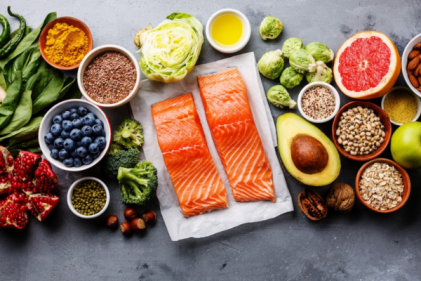Urban legends and old wives tales are nothing new and some of this ‘received wisdom’ has probably been passed down from our own parents. But thanks to science and research, these health facts have been de-bunked. We picked our favourites and why you should stop falling for them, once and for all:
 1. Chewing gum takes seven years to pass through your digestive system
1. Chewing gum takes seven years to pass through your digestive system
Although your body can’t digest chewing gum, it passes through your digestive tract and you eliminate it just like other undigested food you haven’t digested.
2. Plucking a grey hair causes two to grow back
Don't worry - it’s fine to pluck that silver strand that glares at you from the bathroom mirror. Going grey is all to do with genetics and the aging process. The sad truth is that by the time the grey hair has grown back long enough for you to notice (about six months) more grey hair will have started to grow.
3. You should wait an hour after eating before swimming
We all remember our mother's warning to wait at least one hour minutes after eating before swimming. The common belief was that your body diverts so much blood to the digestive system immediately after eating that there will not be enough to keep your arms and legs pumping, thus increasing the risk drowning from cramp. The truth is that, while the body does supply extra blood to the digestive system, not so much blood is diverted to keep your muscles from properly functioning. However, it does give parents a little break after lunch before having to supervise little ones in the pool or sea. Maybe we'll keep this one...
 3. Anti-perspirant deodorants cause breast cancer
3. Anti-perspirant deodorants cause breast cancer
According to the American National Cancer Institute and FDA, there’s never been a proven a link between anit-perspirants and breast cancer. It is thought that this belief came about because some anti-perspirant deodorants contain aluminum, which can show up as a false-positive finding on mammograms. Therefore you should not apply anti-perspirant before a breast cancer screening as it may influence the results.
4. Cats can steal the air from a baby’s mouth
This old wives tale dates back hundreds of years. It was believed that cats were associated with witchcraft and could suffocate a baby by stealing it’s breath from the babys' mouth. However, it’s a good idea to supervise any household pets around babies and small children - for yoru kitty’s safety just as much as the child’s.
5. You can catch a cold from being outside too long
On the contrary, it’s actually better to spend plenty of time outdoors. Being outdoors is one of the best places to be to prevent catching a cold. Colds are caused by bacteria and viruses which are more likely to spread in the winter because we spend more times in close confines with others when you are indoors.
6. Cracking your knuckles causes arthritis
The common claim that cracking your knuckles will cause arthritis appears to be debunked. In a recent study 215 people who don't crack their knuckles (aged 50 to 89) underwent hand radiographs and were compared with the joints of those who regularly cracked their knuckles The study concluded that cracking your knuckles does not cause osteoarthritis. But it still very annoying!
7. The five-second rule for dropped food
The five-second rule should be renamed the zero-second rule. Eating dropped food poses a risk for ingestion of bacteria and subsequent gastrointestinal disease, and the time the food sits on the floor does not change the risk.” If bacteria are present on your floor surface and you drop food, the bacteria will cling to the food immediately on contact. Studies also found that women were more likely to rescue food from the floor than men and sweets where more often rescued than veggies..
8. We only use 10 percent of our brain
Does this mean that we could remove 90% of our brains? Probably not a good idea. Studies of patients with brain damage have shown that harm caused to almost any part of the brain can have specific and lasting effects on a person’s capabilities, which shows that all areas of the brain are in use.





